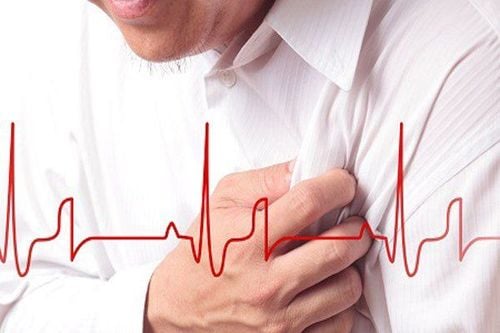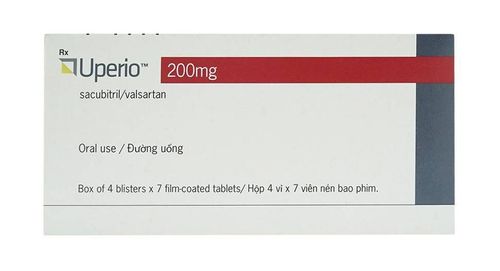This is an automatically translated article.
The article was professionally consulted by Doctor General Internal Medicine - Department of Medical Examination & Internal Medicine - Vinmec Hai Phong International General Hospital.
Grade 1 heart failure is the mildest of the four grades of heart failure. However, if the patient is subjective in treatment, it will make the disease worse quickly. Early detection and lifestyle changes to prevent disease progression help people with grade 1 heart failure recover quickly, limiting the disease to more severe levels.
1. What is grade 1 heart failure?
Heart failure, also known as congestive heart failure, occurs when the heart's muscles do not pump blood as well as it should. Certain causes, such as narrowing of the heart's arteries (coronary artery disease) or high blood pressure, also weaken or stiffen the heart, resulting in the heart not pumping efficiently.
Doctors usually grade heart failure based on the severity of symptoms. Below is the New York Heart Association (NYHA) heart failure classification most commonly used. The classification system is based on the degree of limitation of physical activity in patients with heart failure.
Classification based on symptoms:
Grade 1 - Unrestricted physical activity. Ordinary physical activity does not cause excessive fatigue, palpitations, or shortness of breath.
Grade 2 - Mild limitation of physical activity. At rest, the patient feels comfortable, but normal physical activities make them tired, palpitations, shortness of breath.
Grade 3 - Significant limitation of physical activities. The person is comfortable at rest, but sub-normal activities also cause fatigue, palpitations, or shortness of breath.
Grade 4 - I feel uncomfortable doing nothing. Symptoms occur even at rest. Any activity increases discomfort.
2. Is heart failure grade 1 dangerous?

Grade 1 heart failure is not dangerous and has little impact on the patient's life. However, if not treated well, over time the heart function becomes weaker and weaker, stage 1 heart failure easily progresses to stage 2, 3, 4. At that time, the patient's quality of life is reduced. Severe decline and the risk of many complications: acute pulmonary edema, cardiac arrhythmia, liver failure, kidney failure, stroke, cerebral infarction,...
3. Signs of heart failure grade 1
See your doctor right away if you have the following signs or symptoms of heart failure:
Shortness of breath when you exert yourself or when lying down. Tired and weak. Swelling (edema) of the legs, ankles and feet. Fast or irregular heartbeat. Reduced operability. Persistent cough or wheezing, white or pink or bloody sputum. Increased nocturia. Abdominal distention (ascites). Very fast weight gain due to water retention. Loss of appetite, nausea. Difficulty concentrating or being less alert. Unexpectedly heavy breathing and coughing up pink foam. Chest pain if heart failure is caused by a heart attack. If you have the following symptoms, you should go to the hospital immediately:
Chest pain. Fainting or severe weakness. Fast or irregular heartbeat with shortness of breath, chest pain, or fainting. Sudden and severe shortness of breath, accompanied by coughing up mucus and pink foam. Although these signs and symptoms can be caused by heart failure, there are many other causes, including other serious heart and lung conditions. Therefore, patients need to go to reputable medical facilities for timely diagnosis and treatment by doctors.
In case the patient has been diagnosed with grade 1 heart failure but has symptoms that are worsening, indicating a poor response to treatment, or the disease may progress to grade 2, 3. In this case, see a doctor right away. .

4. Treatment methods for heart failure grade 1
Medical treatment of heart failure usually reduces the amount of fluid in the body, to reduce pressure on the heart and improve the heart's ability to pump blood.
Drug treatment: Doctors often prescribe ACE inhibitors, also known as angiotensin-converting enzymes; or angiotensin receptor antagonists (ARBs), which help the heart pump blood more efficiently.
In some cases, your doctor will prescribe beta-blockers to help your heart work and control your heart rate.
Doctors also often prescribe diuretics for heart failure patients, helping the body flush out excess water. Common diuretics such as hydrochlorothiazide, bumetanide, and furosemide.
Surgery: In the final stages of heart failure, the doctor will advise performing surgery as a long-term solution is implantation of a ventricular assist device. This device acts as a pump to help the heart contract. In cases where the patient's condition is suitable, a total heart transplant may also be an option.
Diet and exercise Exercises to increase heart rate such as brisk walking are very helpful for patients with heart failure.
A healthy, varied diet and regular exercise are recommended for everyone, but are especially important for people with grade 1 heart failure.
Doctors often advise heart failure patients to remove excess salt from the diet, because it causes the body to retain water, alcohol is also advised to stay away.
Physical activities that increase heart rate and breathing, eg swimming, cycling, brisk walking.
Exercise is good for the heart, improves quality of life, even increases life expectancy for patients with heart failure. The doctor will advise the appropriate exercise regimen for each individual.
Cardiovascular Center of Vinmec Times City Hospital effectively treats heart failure
Heart Failure Clinic - Cardiovascular Center Vinmec Times City Hospital is a specialized heart failure clinic operating since March 2019. This is one of the few specialized heart failure clinics built early in Vietnam with reference to the models of the US and Singapore, bringing hope of effective treatment for patients with heart failure.
Advantages when examining and treating heart failure at Cardiovascular Center, Vinmec Times City Hospital include:
Patients are managed according to a unified medical record form, which is convenient for searching and storing in principle. information security. Assess the degree of heart failure, make a specific, optimal and appropriate treatment plan for each patient, on the basis of applying updated guidelines from major cardiology organizations around the world. For patients with late-stage heart failure, the heart failure specialist clinic will hold consultations to offer enhanced treatment measures: Resynchronization, ventricular assist device, heart transplant. Comprehensive treatment of diseases that can lead to heart failure, including optimal medical treatment combined with lifestyle modification, elimination of possible causes leading to heart failure by surgery, cardiovascular intervention, intervention arrhythmia. In addition, at Vinmec International General Hospital, there is also a HEART FUNCTION PACKAGE for customers with risk factors for heart failure, with indications for medical examination and customers in need, to help you detect the condition early. disease, from which the doctor will advise a treatment plan suitable for your health.
Please dial HOTLINE for more information or register for an appointment HERE. Download MyVinmec app to make appointments faster and to manage your bookings easily.
Source: Mayoclinic; Heart













